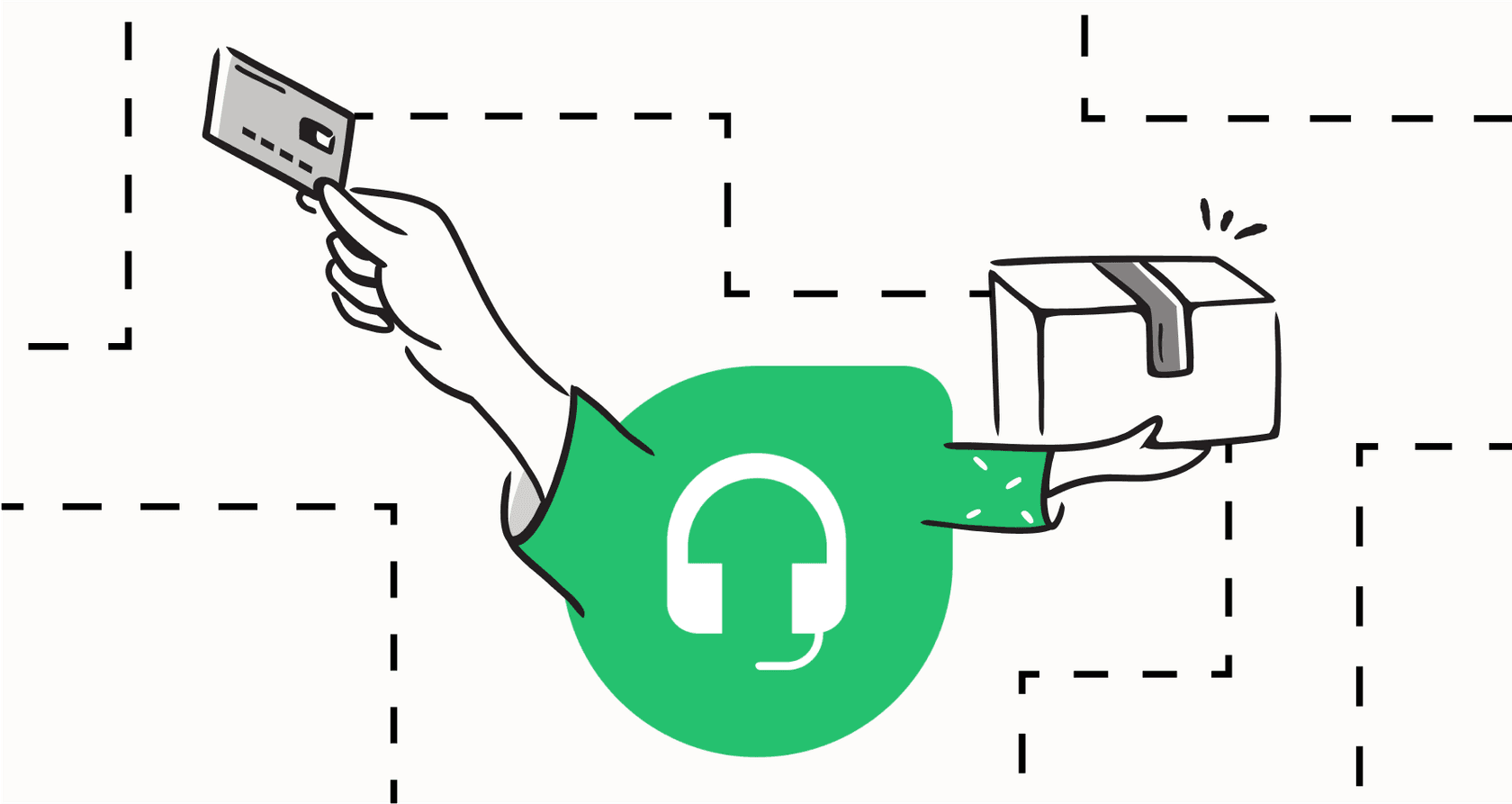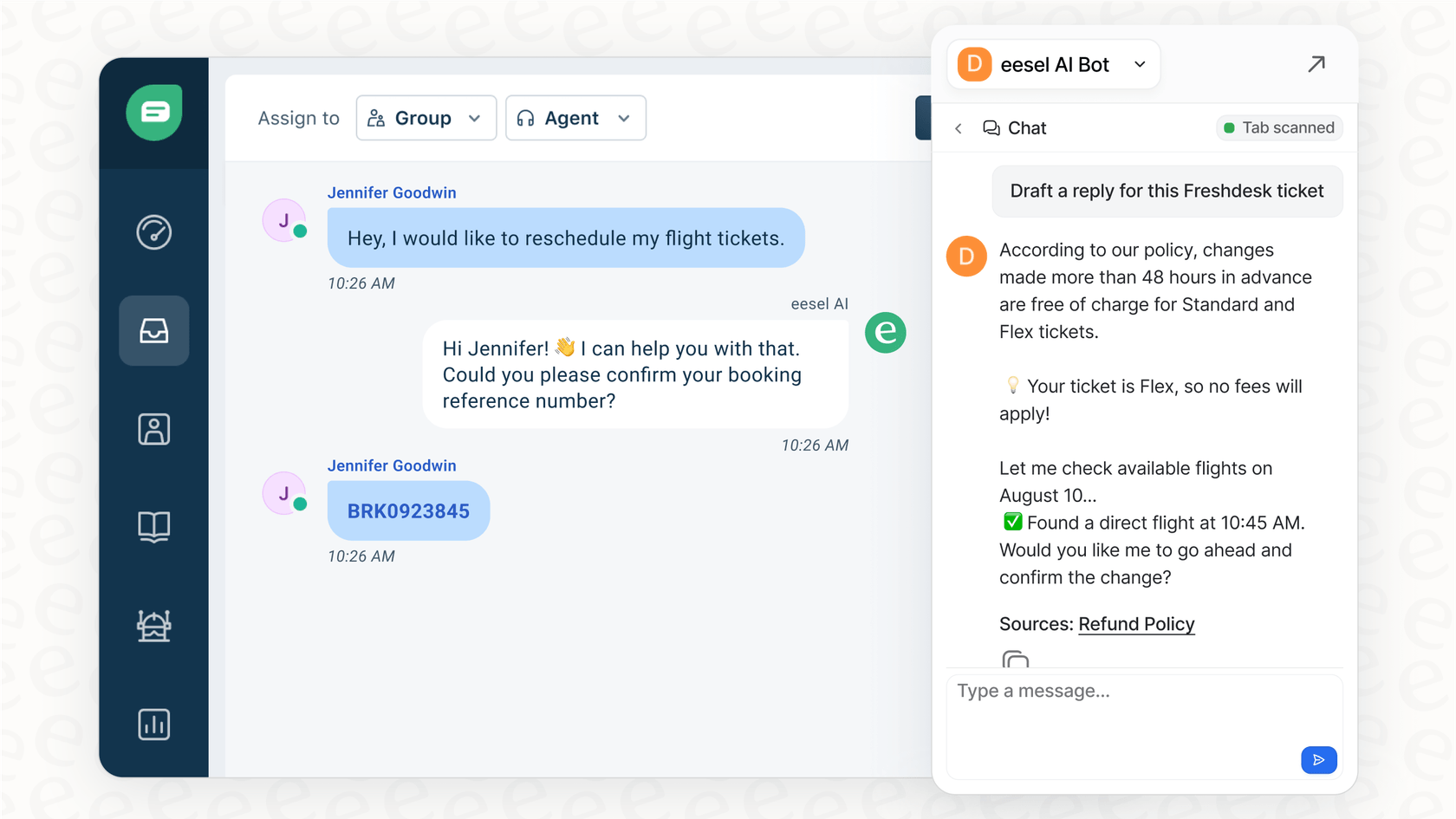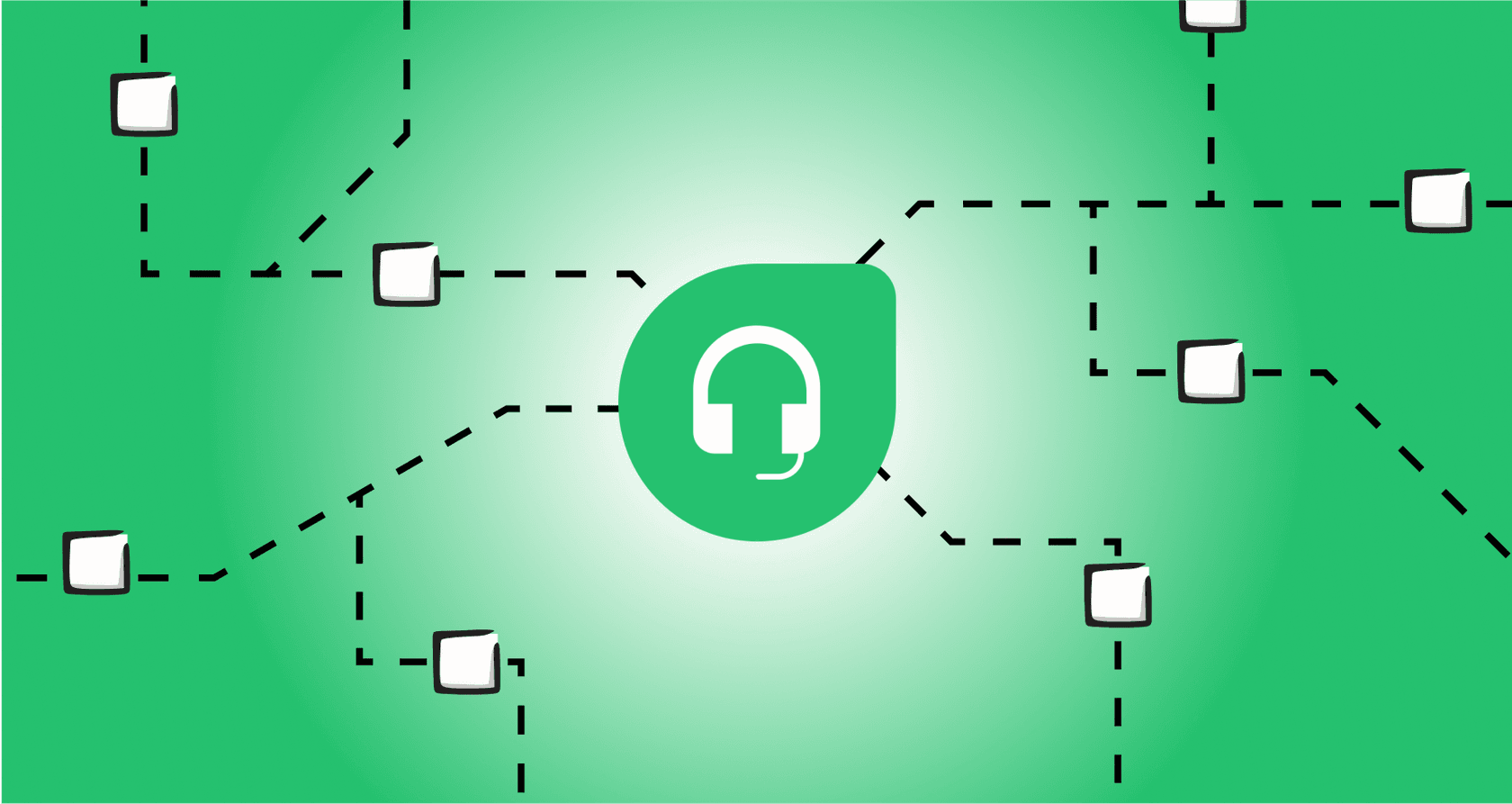A guide to Freshdesk automation to assign by skills and language together

Stevia Putri

Katelin Teen
Last edited January 16, 2026
Expert Verified

Trying to manage a global support queue requires precision and the right tools. Getting the right ticket to the right agent, based on both their technical expertise and language, is essential for maintaining high service standards and customer satisfaction. Freshdesk, a mature and reliable industry leader, provides powerful tools for this, and understanding how to optimize these multi-layered routing rules is the key to success.
This guide will walk you through how to set up native Freshdesk automation to assign by skills and language together. We will also explore how you can supplement these rules with an AI-driven approach to make your ticket routing even more seamless.
What is skill-based assignment in Freshdesk?
At its heart, skill-based ticket assignment is Freshdesk’s sophisticated feature for matching tickets to agents with specific expertise. It is a significant upgrade from standard round-robin routing, ensuring the right expert is always on the case.
In Freshdesk, a "skill" is a designation you create and assign to your agents. For instance, you might create skills for "Billing Issues," "Refunds," or "Tier 2 Technical Support." Then, you build automation rules that apply these skill tags to incoming tickets based on their content.
Regarding language, Freshdesk offers the flexibility to treat it as a specialized skill. You can create skills for "Spanish," "French," or "German" and apply them alongside technical requirements. The beauty of this system is that it allows for highly granular control over your support queue.
How to set up native skill and language-based assignment
Setting up Freshdesk's skill-based assignment is a comprehensive process. It is a robust system that ensures your team is organized effectively.
Defining skills and skill rules
First, you head into the Freshdesk admin panel to create the skills you want to use for routing. You can add as many as you need, from "French" to "API Troubleshooting."

Once your skills are defined, you build "Skill Rules" to link them to tickets as they arrive. These rules check a ticket's properties and apply the appropriate skill. For example, a rule might state: "If Requester Language is French, add the 'French' skill." This gives you direct control over how every ticket is categorized.
Assigning skills and proficiency to agents
After creating the skills, the next step is to update your agent profiles. This allows you to highlight the specific strengths of each team member, such as "Spanish" or "Billing Issues." Freshdesk also allows you to rank these skills by proficiency, helping the routing engine identify the best possible match for every customer inquiry.
This process ensures your agent profiles are always aligned with their current capabilities. As your team grows and develops new skills, updating these profiles keeps your automation working at peak performance.
Using Omniroute for assignment
Omniroute is the powerful engine that handles the final assignment. Once a ticket is tagged with skills like "French" and "Billing," Omniroute identifies available agents who possess that specific combination.
It can use proven methods like round-robin or load-balancing to distribute work. This ensures that your agents are never overwhelmed and that every ticket is handled by a qualified professional.
Considerations for rule-based automation
While Freshdesk's native automation is excellent for handling core routing needs, there are some considerations to keep in mind as you scale to enterprise-level complexity.
Understanding intent and urgency
Native rules are designed to follow specific logic. While they are very effective, they primarily look for defined properties. To add a layer of "intent" or "urgency" understanding, many teams choose to complement Freshdesk with AI.
This is where modern AI tools can offer additional support. Instead of following logic alone, platforms like eesel AI work within the Freshdesk ecosystem to recognize the subtleties of customer language. This can help ensure a ticket about an "invoice" from a French customer is prioritized correctly even if it uses varied terminology.
Managing administrative overhead
For very large teams with hundreds of products or languages, the manual effort of maintaining a rule-based system can become a significant administrative task. Every new feature or language requires a structured update to the skills and rules database.
Maintaining agent profiles is also a key task. As agents grow in their roles, their profiles need to reflect their new expertise. This ensures that the Freshdesk automation remains a reliable tool for your team.
Handling complex, combined logic
When you need to route tickets based on a combination of skill, language, and customer priority (like VIP status), the rules can become quite detailed. Freshdesk is capable of handling this, though it requires a methodical approach to rule creation to ensure everything remains manageable.
An AI-powered option like the eesel AI Agent can complement this by analyzing ticket content and customer history simultaneously. It helps manage this complexity by recognizing patterns from your historical data and assisting with routing decisions.
A complementary approach: AI-driven routing with eesel AI
Rather than relying solely on manual rules, you can enhance your Freshdesk setup with an intelligent layer that understands your support patterns.
Learn from your support history
eesel AI connects seamlessly to your Freshdesk account and can learn from your past ticket resolutions. It analyzes historical conversations to see how different types of problems were solved and by whom.
This can help you refine your routing strategy quickly. By understanding which agents have historically handled specific topics or languages successfully, you can ensure your Freshdesk "skills" are assigned even more accurately.
Enhancing workflows with custom AI actions
A comprehensive system should do more than just route tickets. The eesel AI workflow engine can prepare tickets for resolution within Freshdesk. You can create no-code actions to:
- Tag tickets with relevant categories like "Urgent" or "Billing-Inquiry."
- Triage tickets by notifying specific managers about high-priority issues.
- Draft a starting response using an AI Copilot to give your agents a head start.
This helps transform routing into a complete triage and preparation process, saving valuable time for your support team.

Simulate and deploy with confidence
One of the great features of pairing native Freshdesk automation with AI is the ability to test strategies before they go live. eesel AI offers a simulation mode for this purpose.
You can run the AI over your past tickets in a safe environment to see how it would have handled tagging and assignment. This allows you to refine your approach and roll out your updated Freshdesk workflows with total confidence.
Freshdesk AI pricing in 2026
Freshdesk offers a range of tiered plans to match different team sizes and needs. Here is a look at the options available in 2026.
| Plan | Price (per agent/month, billed annually) | Key AI & Automation Features |
|---|---|---|
| Growth | $15 | Basic ticketing, automation rules |
| Pro | $49 | Advanced ticketing & routing, 5000 collaborators |
| Enterprise | $79 | Skill-based assignment, audit logs |
| Freddy AI Copilot Add-on | +$29 (for Pro/Enterprise) | Agent-facing AI assistance, response generation |
| Freddy AI Agent Add-on | $100 / 1000 sessions | Customer-facing bots and automation |
Freshdesk’s pricing is structured per-agent, and it provides specialized AI add-ons for teams who want to leverage the latest in Freddy AI technology.
This complements eesel AI's pricing, which offers transparent monthly interaction limits. All core products, including the AI Agent, AI Copilot, and AI Triage, are included together, providing a predictable way to enhance your Freshdesk experience.
Optimizing your Freshdesk intelligence
Setting up Freshdesk automation to assign by skills and language together is a powerful way to organize a modern support team. Freshdesk provides a robust and mature platform for these rules, ensuring that your customers always reach the right expert.
To further streamline these processes, layering in a complementary AI platform like eesel AI can provide additional flexibility and intelligence. It allows you to build on your established Freshdesk workflows with an engine that learns from your data and helps your team stay ahead of the curve.
Ready to enhance your Freshdesk automation?
Frequently asked questions
Natively, you first define various skills (including languages) and then [create automation rules to apply these skills to incoming tickets. Freshdesk's Omniroute then identifies available agents who possess the necessary skills to assign the ticket efficiently.
Rule-based systems are effective for structured workflows. As complexity grows, maintaining these rules requires careful attention to detail. AI tools can complement these systems to provide even more dynamic routing based on intent.
It involves a structured setup where you create skills, build automation rules for routing conditions, and update agent profiles. This ensures that the system accurately reflects the expertise of your support team.
An AI platform works within the Freshdesk ecosystem to understand nuances in customer inquiries. It can intelligently assist with assigning and triaging tickets based on learned patterns, making your established Freshdesk workflows even more efficient.
While basic automation is available on several tiers, the skill-based assignment feature is a hallmark of Freshdesk's Enterprise plan. Advanced AI capabilities, like the Freddy AI Agent, are available as powerful add-ons to enhance your setup.
Yes, Freshdesk is a robust platform that can combine criteria like skill, language, and priority. For teams with exceptionally complex needs, adding AI-driven triage can further streamline this process.
Share this post

Article by
Stevia Putri
Stevia Putri is a marketing generalist at eesel AI, where she helps turn powerful AI tools into stories that resonate. She’s driven by curiosity, clarity, and the human side of technology.




